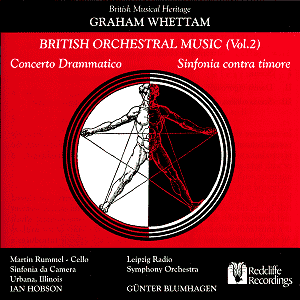 Composer: Graham Whettam
Composer: Graham Whettam
Works: Concerto Drammatico, Sinfonia contra timore
Performers: Martin Rummel (cello), Sinfonia da Camera, Urbana, Illinois/Ian Hobson, Leipzig Radio Symphony Orchestra/Günter Blumhagen
Recording: Concerto, Sept 2000 Univ Illinois, Sinfonia, Oct 75 German Radio
Label: Redcliffe Recordings RR 017
Graham Whettam, a composer whose reputation has been gradually established yet remains somewhat overshadowed by his contemporaries, presents a compelling exploration of late 20th-century anxieties in the two substantial works featured on this recording. The Sinfonia contra timore, composed in 1962, encapsulates the dread of nuclear conflict that permeated the era, while the Concerto Drammatico for cello, written 35 years later, reflects a continued engagement with themes of turmoil and lamentation. These compositions, now receiving their due through this mid-price release, offer listeners a window into Whettam’s distinctive musical language that straddles the line between modernist ambition and lyrical introspection.
The Sinfonia contra timore opens with a palpable tension, a reflection of the societal anxieties of its time. The orchestration is marked by vigorous gestures and a powerful command of orchestral color. The Leipzig Radio Symphony Orchestra, under Günter Blumhagen, delivers a performance that captures the raw emotional weight of the score. The first movement, with its frenetic energy, invites comparisons to Shostakovich’s symphonic oeuvre, yet Whettam’s voice emerges with its own stark individuality. The thematic material, though at times veering into bombast, possesses a rhythmic drive that compels attention. However, the finale’s relentless intensity risks overstaying its welcome, potentially alienating listeners who might prefer a more measured conclusion.
Martin Rummel’s interpretation of the Concerto Drammatico presents a contrasting yet complementary outlook. The cello part is expressive, yet, despite Rummel’s commendable technique and sensitivity, the concerto lacks the cohesive engagement one hopes for in such an ambitious work. The introspective musing at approximately 8 minutes into the second movement is a standout moment, showcasing Rummel’s lyrical capabilities. Yet, throughout the work’s 32-minute span, the material often fails to sustain a consistent narrative arc, leaving the listener in search of a more profound emotional connection. This inconsistency detracts from the overall impact, raising questions about the thematic development and memorability of the cello lines.
Sound quality across the recording is commendable, with a clean balance that allows orchestral detail to shine through. The engineering effectively handles the contrasting dynamics of the orchestral forces, ensuring that the various textures are articulated clearly. This technical proficiency enhances the listening experience, particularly in the Sinfonia contra timore, where the orchestral palette is rich and varied.
Whettam’s decision to employ Latin titles rather than conventional numerical designations may obscure his works’ chronological context for some listeners, making them less accessible. Yet, this choice reflects a broader artistic sensibility that prioritizes thematic resonance over mere categorization. The comparison to contemporaneous British composers, such as Robert Simpson, is appropriate; however, Whettam’s voice remains singular, marked by a persistent engagement with the darker aspects of human experience.
The combination of these two works on a single disc offers a significant opportunity to delve into Whettam’s unique musical landscape. While the Sinfonia contra timore resonates with urgency and a potent sense of protest, the Concerto Drammatico falters under the weight of its own ambitions. Whettam’s oeuvre, while undeniably compelling, often grapples with the tension between ambition and execution. The result is a striking yet flawed representation of a composer who has much to say, even if the means of expression occasionally fall short. Further recordings of his music will hopefully illuminate his voice even more, allowing it to resonate within the broader narrative of contemporary classical music.